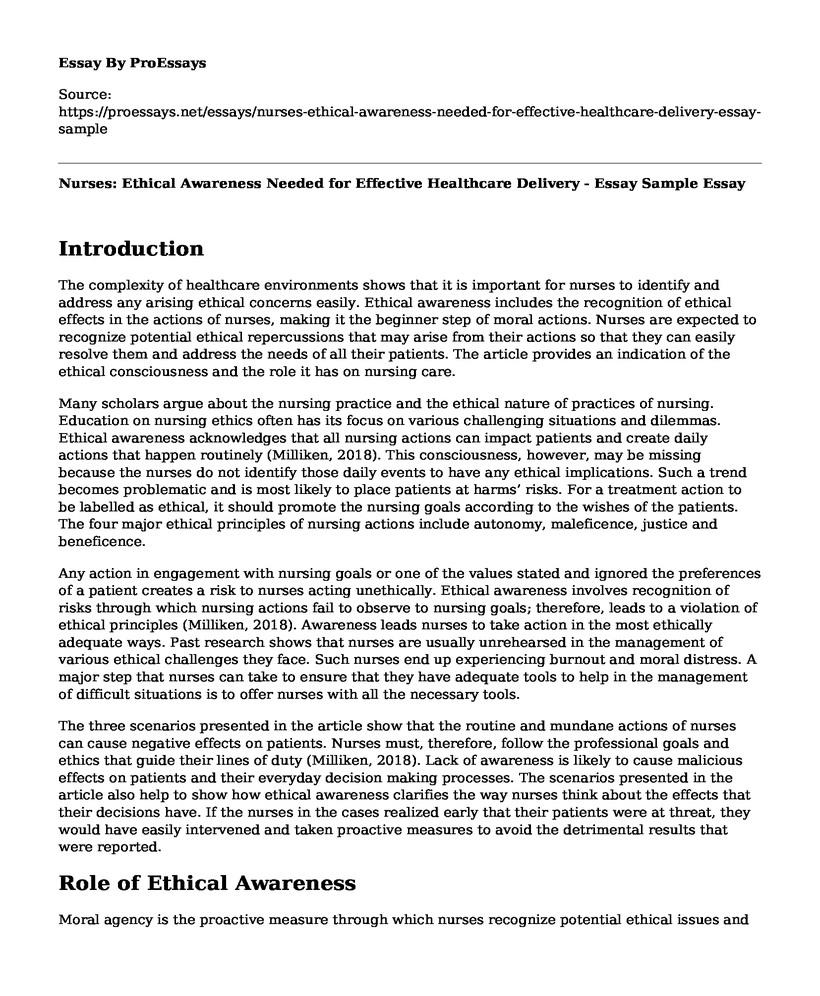Introduction
The complexity of healthcare environments shows that it is important for nurses to identify and address any arising ethical concerns easily. Ethical awareness includes the recognition of ethical effects in the actions of nurses, making it the beginner step of moral actions. Nurses are expected to recognize potential ethical repercussions that may arise from their actions so that they can easily resolve them and address the needs of all their patients. The article provides an indication of the ethical consciousness and the role it has on nursing care.
Many scholars argue about the nursing practice and the ethical nature of practices of nursing. Education on nursing ethics often has its focus on various challenging situations and dilemmas. Ethical awareness acknowledges that all nursing actions can impact patients and create daily actions that happen routinely (Milliken, 2018). This consciousness, however, may be missing because the nurses do not identify those daily events to have any ethical implications. Such a trend becomes problematic and is most likely to place patients at harms’ risks. For a treatment action to be labelled as ethical, it should promote the nursing goals according to the wishes of the patients. The four major ethical principles of nursing actions include autonomy, maleficence, justice and beneficence.
Any action in engagement with nursing goals or one of the values stated and ignored the preferences of a patient creates a risk to nurses acting unethically. Ethical awareness involves recognition of risks through which nursing actions fail to observe to nursing goals; therefore, leads to a violation of ethical principles (Milliken, 2018). Awareness leads nurses to take action in the most ethically adequate ways. Past research shows that nurses are usually unrehearsed in the management of various ethical challenges they face. Such nurses end up experiencing burnout and moral distress. A major step that nurses can take to ensure that they have adequate tools to help in the management of difficult situations is to offer nurses with all the necessary tools.
The three scenarios presented in the article show that the routine and mundane actions of nurses can cause negative effects on patients. Nurses must, therefore, follow the professional goals and ethics that guide their lines of duty (Milliken, 2018). Lack of awareness is likely to cause malicious effects on patients and their everyday decision making processes. The scenarios presented in the article also help to show how ethical awareness clarifies the way nurses think about the effects that their decisions have. If the nurses in the cases realized early that their patients were at threat, they would have easily intervened and taken proactive measures to avoid the detrimental results that were reported.
Role of Ethical Awareness
Moral agency is the proactive measure through which nurses recognize potential ethical issues and quickly act to help resolve them. The nurses are expected to place such perspectives in practice and use their professionalism to act as representatives to represent the patients (Milliken, 2018). The role of ethical consciousness in the care of patients proposes that nurses, nurse leaders and organizations which provide healthcare to patients are responsible for the development of such a skill. Approaches to increase ethical consciousness in clinics include interventions ate individual, organizational or unit levels. A good example of this concept is that nurses can ensure they improve ethical awareness through the development of ethical competences, skill sets and ethical understanding.
Interventions that can foster collective and individual ethical awareness include nurse leaders creating chances for the specific nurses to cultivate resilience and moral agency, modelling and contributions to shifting values that are aimed towards organizational cultures that support ethical practices and awareness. The growth and fostering of ethical consciousness require a fundamental recognition of ethics in everything that nurses do. Development of ethical awareness empowers nurses to act as moral representatives and help offer ethical care to patients.
Reference
Milliken, A. (2018). Ethical awareness: what it is and why it matters. OJIN: The Online Journal of Issues in Nursing, 23(1). https://ojin.nursingworld.org/MainMenuCategories/ANAMarketplace/ANAPeriodicals/OJIN/TableofContents/Vol-23-2018/No1-Jan-2018/Ethical-Awareness.html
Cite this page
Nurses: Ethical Awareness Needed for Effective Healthcare Delivery - Essay Sample. (2023, Aug 10). Retrieved from https://proessays.net/essays/nurses-ethical-awareness-needed-for-effective-healthcare-delivery-essay-sample
If you are the original author of this essay and no longer wish to have it published on the ProEssays website, please click below to request its removal:
- Nursing Informatics Administrative Applications
- Paper Example: Public Health Interventions - Chronic Kidney Disease Initiative
- Tobacco as a Health Issue Essay
- Paper Example on Exploring Different Metabolic & Anthropometric Parameters
- Alzheimer's: Memory Loss, Dementia & Brain Cell Death - Research Paper
- Research Paper on Bats & Viruses: The Spillover Effect & Coronavirus
- Nursing Student Journey at John Hopkins: Overcoming Challenges and Learning - Essay Sample







